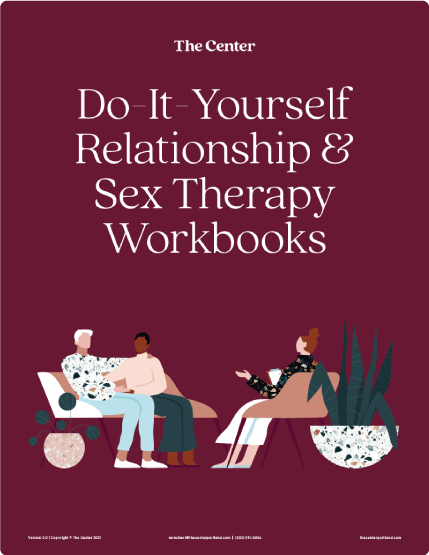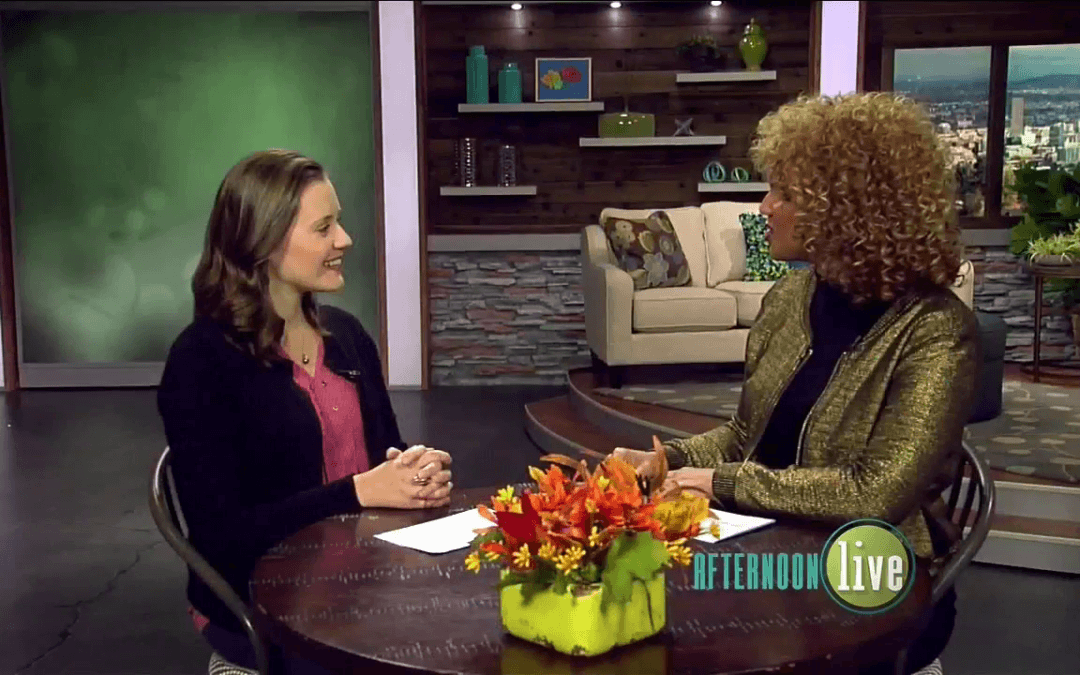This month I spoke with Tra’Renee on KATU’s Afternoon Live about how to trust your partner without snooping. Click the play button above to watch the full interview or read below for a more detailed description of our conversation!
To snoop, or not to snoop, that is the question.
Okay, not quite as eloquent as the famous Shakespeare quote, but I’m pretty sure that is the question Shakespeare would have asked if he lived in the era of email, Facebook, and texting.
We’re primed to feel emotions like fear and jealousy in our long-term relationships. These emotions are not new and they are never going away (thanks, human nature). Fear and jealousy are not bad emotions; they can actually be adaptive.
For example, fear keeps me alert to potential threats to my relationship. Jealousy reminds me that if I don’t work hard to stay connected to my partner, another more appealing person might show up and sweep them away. These emotions are adaptive when felt in moderation! They can help guide us towards creating a stronger, safer relationship. They can create a roadmap for how to trust your partner!
But here’s the problem: our technology-saturated culture has exponentially increased the complexity of modern relationships.
It’s hard to feel fear and jealousy “in moderation” when your partner practically lives on his computer, doing who-knows-what and talking to who-knows-who for hours every day. The potential threats to the security of your relationship increase with each new smartphone software update!
Okay, that’s probably a bit exaggerated, but it is true that technology has made it easier than ever to cross boundaries in our relationships. It’s hard to learn how to trust your partner when it seems like the world is against you.
As a couples therapist, I field conversations every day about whether it’s okay to “snoop” on your partner.
For example, couples often argue about whether they need to divulge their email, phone, and social media passwords so that their partner can see what they’re up to. Or one partner gets caught looking through the other’s text messages without consent, leading to a blow-up argument… an argument that often ends with the snoop-er believing that the snoop-ee must be guilty of something, because “why else would she be so upset that I was reading her messages?!”
When you think about how to trust your partner, do you feel like snooping is your only sure-fire defense against boundary violations? I’m sure you can think of a dozen examples of ways you’ve struggled with the what-do-I-deserve-to-know dilemma in your own relationship.
To solve the dilemma and teach you how to trust your partner, I’ve created the guide below. This guide will help you and your partner have a structured, productive conversation about snooping.
Part 1: Why you are snooping?
Your gut instinct is probably to start this conversation with an argument about the morality of snooping. Is it right or is it wrong? I’m going to encourage you to save this part of the conversation for later. First, we need to understand what is motivating your impulse to snoop. This will help clarify strategies for how you can trust your partner without snooping.
Here are a few ideas to get the conversation rolling:
Possible Motivation #1: Has there been an emotional or sexual transgression in your relationship? Or are you afraid your partner is currently cheating?
This is probably the most intense motivator for snooping. If you’ve been cheated on or have a strong belief that your partner is currently being unfaithful, your instinctual impulse to discover the truth is on overdrive.
You are feeling overwhelmed with fear and your emotional brain is telling you that the only way to soothe the fear is to snoop for the truth. I understand that impulse and admire you for trying to protect yourself.
But here’s the deal – if you haven’t clearly negotiated rules and boundaries around snooping, your behavior is only going to make the situation worse.
I’m not telling you to stop, but I am strongly encouraging you to have an upfront conversation with your partner about what you need to rebuild safety after a transgression or about your fears that they are currently crossing a boundary. Don’t rely on snooping to heal what is broken in your relationship.
If you are trying to learn how to trust your partner again and regain security following an affair, I recommend you check out the books Not “Just Friends” and State of Affairs to help you create a clearly negotiated plan for moving forward. Most importantly, I encourage you to seek out the guidance of a specialized couples counselor to help you through this difficult process. I know you desperately want to understand how to trust your partner again, but I promise you, snooping is not going the solution to your problem.
Possible Motivation #2: Do you have a history of being lied to in relationships?
Sometimes our drive to snoop has nothing to do with what has happened in our current relationship. Do you have a history of being cheated on or lied to in your romantic relationships? Did you grow up with caregivers who weren’t consistent or reliable? Basically, have you learned over time that important people in your life cannot be trusted?
If so, you’re definitely not alone. It makes complete sense that fear is impacting your ability to feel safe with your current partner. You know how it feels to be lied to, cheated on, or emotionally neglected, and you don’t want it to happen again. You deserve better, and it is possible to create safer, more secure relationships in your life.
But here’s the deal, if you haven’t clearly negotiated rules and boundaries around snooping, your behavior is only going to make the situation worse. (Does that sentence sound familiar? We might be building up to a theme here!)
If your partner hasn’t consented to you going through his personal accounts and profiles, and he hasn’t done anything unethical within the relationship, your snooping is going to make him feel like he can’t trust you. That’s the opposite of what you’re trying to create here! It will be difficult to determine how to trust your partner when your partner no longer trusts you. Don’t rely on snooping to create a sense of safety in your relationship.
Possible Motivation 3: Have you clearly negotiated boundaries in your relationship?
If #1 and #2 don’t apply to your situation but you find that snooping is still a problem in your relationship, we are probably dealing with a case of unclear boundaries.
Are you totally confused as to why your partner keeps casually looking through your Facebook feed or opening your email account to check for that Amazon shipping notification without your permission?
Maybe your partner grew up in a family that believed in full transparency (i.e. it’s no big deal to look through each other’s things) whereas you grew up in a family that valued privacy (i.e. you would never even consider opening his phone to search for something if you couldn’t find your own). This might have nothing to do with how to trust your partner, your partner might just be nosey!
If you don’t have clear, specific conversations about boundaries, you will end up in messy conflict about what is considered ethical behavior in your relationship.
Part 2: Privacy versus Secrecy
I want you and your partner to close your eyes and take a few slow, deep breaths. Then I want you to say the word “Privacy” out loud and notice what emotion it evokes within your body. Write it down. Close your eyes and take another deep breath. Now say the word “Secrecy” out loud and notice what emotion it evokes within your body. Write it down. Take a few minutes to compare your responses.
For most people, these words evoke very different emotions. Privacy tends to evoke feelings of independence and strength, whereas secrecy evokes feelings of insecurity and danger. I want you to avoid mistaking secrecy for privacy within your relationship. Every human deserves privacy, but secrecy destroys relationships.
Talk about what these words mean to you and brainstorm ways you can cultivate healthy privacy boundaries in your relationship. Kick secrecy to the curb!
Part 3: Setting Clear Boundaries
Now that you’ve discussed the difference between healthy privacy and unhealthy secrecy, let’s talk about boundaries. The key to learning how to trust your partner is to be on the same page about the dos and don’ts of “snooping” in your relationship.
You might find that you and your partner have different privacy values. For example, maybe you want more privacy than your partner does. That’s okay! Relationships are all about compromise, right?
For example, let’s say that you value privacy more than your partner. Your partner wants to share all social media passwords, but you don’t. You’re not doing anything shady – you just value privacy and don’t think it’s necessary for your partner to have access to your accounts!
Revisit Part 1 of this conversation. Do you understand why your partner wants access to your passwords? Will having this access help your partner feel safe in this relationship? If so, can you have a conversation about what the rules are for using the passwords?
Here’s an example compromise: We will share all social media passwords but we won’t login to the other’s account without first asking permission. This compromise will serve two purposes: 1) it will ensure that you don’t feel your partner is secretly snooping on you and 2) it will give you an opportunity to talk about the underlying fears that might be contributing to your partner feeling insecure in the relationship.
An important change happens when you set clear boundaries with your partner…you completely eliminate snooping from your relationship!
If you set clear rules and boundaries around what behaviors are acceptable in your relationship (with a solid understanding of why those behaviors are important to both you and your partner), you’re no longer snooping on each other – you’re simply sharing information with no risk of conflict.
In general, if you feel like you’re snooping or if you think your partner is snooping, you’re probably engaging in secretive behavior. Snooping = Secretive Behavior = BAD! This is not an effective solution to the how to trust your partner dilemma!
If you have clear boundaries and know that what you’re doing is okay with your partner, you’re actually engaging in sharing behavior. Sharing = Respectful of Privacy = GOOD!
There you have it! The three-step conversation to resolving the snooping dilemma with your partner.
Here’s the recap:
- Explore why you feel the need to snoop (and remember to have compassion for each other’s experience!).
- Understand the difference between privacy values and secrecy.
- Set clear boundaries that both you and your partner feel good about.
Good luck on your journey to a healthier, happier relationship!






